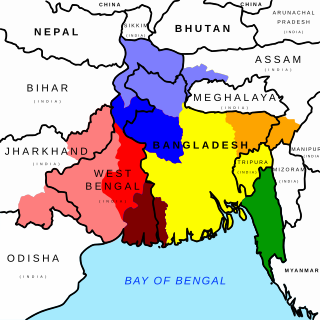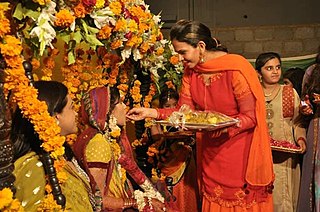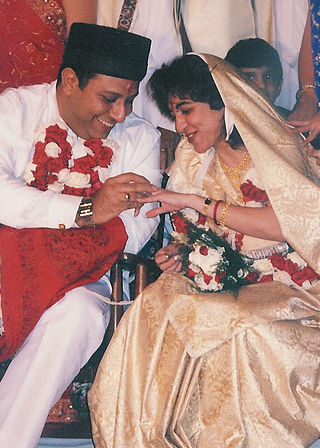
A wedding is a ceremony where two people are united in marriage. Wedding traditions and customs vary greatly between cultures, ethnic groups, races, religions, denominations, countries, social classes, and sexual orientations. Most wedding ceremonies involve an exchange of marriage vows by a couple, presentation of a gift, and a public proclamation of marriage by an authority figure or celebrant. Special wedding garments are often worn, and the ceremony is sometimes followed by a wedding reception. Music, poetry, prayers, or readings from religious texts or literature are also commonly incorporated into the ceremony, as well as superstitious customs.

An engagement or betrothal is the period of time between the declaration of acceptance of a marriage proposal and the marriage itself. During this period, a couple is said to be fiancés, betrothed,intended, affianced, engaged to be married, or simply engaged. Future brides and grooms may be called fiancée (feminine) or fiancé (masculine), the betrothed, a wife-to-be or husband-to-be, respectively. The duration of the courtship varies vastly, and is largely dependent on cultural norms or upon the agreement of the parties involved.
A dowry is a payment, such as property or money, paid by the bride's family to the groom or his family at the time of marriage. Dowry contrasts with the related concepts of bride price and dower. While bride price or bride service is a payment by the groom, or his family, to the bride, or her family, dowry is the wealth transferred from the bride, or her family, to the groom, or his family. Similarly, dower is the property settled on the bride herself, by the groom at the time of marriage, and which remains under her ownership and control.
A Hindu wedding, also known as Vivaha, Marathi: Lagna (लग्न), Bengali: Bibaho (বিবাহ), Kalyanam, Kannada script: ಮದುವೆ (Maduve), Tamil: திருமணம் (Tirumanam), or Pelli, is the traditional wedding ceremony for Hindus. The wedding ceremonies are very colourful, and celebrations may extend for several days and usually a large number of people attend the wedding functions. The bride's and groom's home—entrance, doors, wall, floor, roof—are sometimes decorated with colors, flowers, and other decorations.

A Bengali Muslim wedding is a Bengali wedding in accordance to Muslim faith.

Marriage in Pakistan pertains to wedding traditions established and adhered by Pakistani men and women. Despite their local and regional variations, marriages in Pakistan generally follow Islamic marital jurisprudence. Marriages are not only seen as a union between a husband and a wife, but also an alliance between their respective families. These traditions extend to other countries around in the world where Overseas Pakistani communities exist.

Punjabi wedding traditions are a strong reflection of Punjabi culture with ritual, song, dance, food, and dress that have evolved over centuries.

A Zoroastrian wedding is a religious ceremony in Zoroastrianism in which two individuals, a man and a woman, are united. In Zoroastrianism, marriage within the community is encouraged, and is greatly favored in religious texts. The following information will detail ceremony procedures and traditional processes for a Zoroastrian wedding.
Chinese pre-wedding customs are traditional Chinese rituals prescribed by the 禮記 (láih gei, the 儀禮 (yìh láih and the 白虎通 condensed into a series of rituals now known as the 三書六禮. Traditionally speaking, a wedding that incorporates all six rites is considered a daaih chéui.

Traditional Russian weddings can last between two days and one week. The celebration usually involves dancing, singing, toasting, and banqueting. The best man and bridesmaid are called "Witnesses" or "Свидетели" in Russian. The ceremony and the ring exchange take place on the first day of the wedding. Russian weddings ceremonies have undertaken a certain amount of Western traditions, including incorporating maids of honour into the wedding party.
Arabic weddings are ceremonies of matrimony that contain Arab influences or Arabic culture.
In the United States and Canada, weddings follow traditions often based on religion, culture, and social norms. Most wedding traditions in the United States and Canada were assimilated from other, generally European, countries. Marriages in the U.S. and Canada are typically arranged by the participants and ceremonies may either be religious or civil. There is a tradition that the prospective bridegroom ask his future father-in-law for his blessing.

Muslim marriage and Islamic wedding customs are traditions and practices that relate to wedding ceremonies and marriage rituals prevailing within the Muslim world. Although Islamic marriage customs and relations vary depending on country of origin and government regulations, both Muslim men and women from around the world are guided by Islamic laws and practices specified in the Quran. Islamic marital jurisprudence allows Muslim men to be married to multiple women.
Bahaghara is a wedding ceremony performed by Odia Hindu people in the Indian state of Odisha. There are subtle differences in the rites observed by different castes. In Odia marriage rituals, the mother of the bridegroom does not take part in the ceremony. The Utkala Brahmins have their weddings only in the daytime, preferably at midday or in the morning, while the other caste weddings are done during the evening or night. There is the custom of sending betel nuts to family friends for inviting them to the marriage. The first invitation is sent to the family deity as a respect to the lord. Marriages in Odisha are mostly fixed and arranged by the parents. Marriages for serving or capturing is not common.

Bride price, bride-dowry, bride-wealth, bride service or bride token, is money, property, or other form of wealth paid by a groom or his family to the woman or the family of the woman he will be married to or is just about to marry. Bride dowry is equivalent to dowry paid to the groom in some cultures, or used by the bride to help establish the new household, and dower, which is property settled on the bride herself by the groom at the time of marriage. Some cultures may practice both simultaneously. Many cultures practiced bride dowry prior to existing records.

Traditional Hajong marriage is a ceremonial ritual that involves a marriage established by pre-arrangement between families. Within Hajong culture, romantic love and widow re-marriage was allowed, and monogamy was the norm for the Hajong people.
Wedding customs in Ethiopia vary among the tribes of the country.
Weddings in Myanmar, considered auspicious occasions in Burmese culture, reflect various ethnic, religious, and regional traditions. Depending on an individual's family social economic status, personal preferences and titles held, Burmese weddings can be religious or secular, and extravagant or simple. Wedding expenses are covered by the groom's family. Myanmar is a predominantly Buddhist country, and many wedding customs and traditions are influenced by Buddhism.

Lefe is a Hausa wedding tradition that originated in the Hausa Land, Northern Nigeria (Arewa). The tradition asks the groom to purchase beautiful and expensive items as a grand gift for his bride. The groom's female relatives, including his aunts, take the gifts to the bride's house before the wedding. Upon arrival, the bride's parents welcome them and offer refreshments, along with a small reward.














